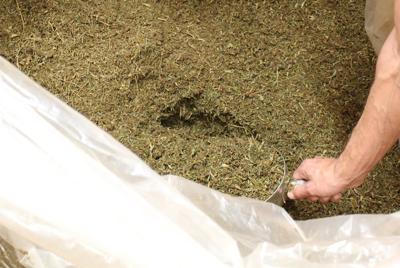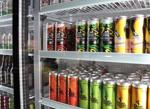While hemp is in the ground, the state Department of Agriculture has authority over it. After that, it’s anybody’s guess.
A lack of clear rules for hemp-derived THC and CBD products has led to self-policing in the state's booming hemp industry, allowing potentially untested or illegal products to make their way to consumers.
While rule-makers wrestle with how to regulate hemp, the industry faces legal uncertainty, numerous raids and threats to its economic viability.
The problem, according to sources in the hemp industry, is that many lawmakers don't understand hemp, how it grows or what chemicals it contains.
As a result, laws affecting every part of the industry — from farming to retail — are full of gaps and grey areas.
"The regulations need to (be) fixed," said Allison Justice, founder of the SC-based Cannabis Research Coalition. "That's the only thing that's going to help the farmers, is having it written in law how to behave because it's kind of up to self-interpretation."
Even where state agencies have power over hemp, they fall short of creating meaningful regulations. Without legislation to guide them, both the S.C. Department of Health and Environmental Control and Department of Agriculture say their hands are tied.
Testing gaps can lead to illegal hemp products
Farmers are only required by law to test their hemp once before harvesting, but they can continue growing that same tested hemp for up to a month longer. In that time, the amount of THC in the plant can double or triple — possibly pushing it well over the legal limit even after state regulators have given it the green light.
In other states, like Tennessee and Georgia, this discrepancy might be caught during mandatory testing for finished hemp products.
But South Carolina doesn’t require manufacturers or retailers to test products before selling them to the public. Some retail businesses test products anyway, some don’t.
A single lab test is about $50, but the cost of testing each batch of an individual product can add up. That number increases exponentially if a business wants to test a variety of products.
"If you have to constantly be testing all of these batches that are going through your store, that's going to cut into your bottom line," said Nathaniel Futral, chief operating officer of PHP Processing, a hemp processing company in Greenville.
"If no one's mandating you to do it, a lot of people are motivated by the dollar, so they won't do it," Futral said.
Not all labs use best testing methods
A product containing hemp-derived THC extract is typically diluted before it's added to a hemp product. That means that even if the extract came from an illegal plant, the product could still contain only legal amounts of THC, according to Hunter Flanigan, a lab manager at Clearwater Biotech.
Flanigan’s lab is one of two federally certified drug labs in the state. In the hemp industry, obtaining proof of product testing from one of these two labs is considered the gold standard.
There are other labs in South Carolina that can provide this service, but not all labs are created equal and not all testing is the same.
It is a best practice for product-makers to use state or federally certified labs when testing for THC, CBD or other cannabinoids — though it is not required by state law.
"You want labs that are certified in these processes and these laboratory methods, because again … it's about traceability," Futral said.
What is the danger to consumers?
While retailers might not test products for THC, CBD and other hemp-related chemicals, manufacturers usually will.
Reputable manufacturers will display the test results, also known as certificates of analysis, alongside their products. Companies like Greenville-based Rebel Rabbit and Charleston-based High Rise Beverage Company include this information on their websites.
Certificates disclose how much THC and CBD is in a hemp product, where it was tested and when.
When it comes to reading a certificate of analysis, Justice said consumers should pay attention to markers of authenticity.
Real certificates will display a QR code that consumers can scan to verify that the results of a test haven’t been doctored by the company displaying the certificate.
It's not foolproof, Justice said, because sometimes a certificate doesn't match the batch of product with which it's sold.
"So then you're slipped something that's hot (over the legal limit for THC) or not really what's on the label, and there's no oversight, (no) organization that's making sure you don't do that," Justice said.
The cost to obtain a certificate of analysis can vary based on how comprehensively a product is tested. Testing for THC and CBD content is considered the most basic test. That could set a business back about $50, Justice said.
Testing a product for the presence of mycotoxins, mold and heavy metals can cost upwards of a few hundred dollars.
Finances can be a limiting factor for many businesses, Justice said, as "you kind of have to pick and choose when and where it makes the most sense to test."
A bill proposed in the Legislature would mandate comprehensive testing for hemp products, but it has yet to pass either chamber.
Who is in charge? State agencies can't agree.
DHEC recently issued narrow guidance for South Carolina’s hemp-infused beverage industry.
In a Feb. 22 letter, the department said manufacturers and distributors of hemp-infused soft drinks need to provide proof of testing for each product they plan to sell in the state.
DHEC’s letter was silent on what regulations would be implemented for hemp-infused food or supplements.
Neither DHEC nor the Department of Agriculture say they have authority to regulate these products.
“Once the hemp is processed into a hemp product, it’s no longer under the oversight of the Hemp Farming Program,” Agriculture Department spokesperson Eva Moore said in an emailed statement.
Is smokable hemp legal in South Carolina?
It's also unclear whether the Department of Agriculture has authority over smokable hemp or dried hemp flower.
The confusion hinges on whether the act of drying and curing hemp counts as processing it. State law prohibits the sale or possession of “raw” or “unprocessed” hemp flower, but the law doesn’t clearly define what it means to process hemp.
The substance's legality in South Carolina has been the subject of ongoing debate.
Law enforcement agencies, including the state attorney general's office, have taken the position that dried hemp flower is unprocessed, and therefore not allowed.
The Department of Agriculture said it advises permitted hemp handlers not to sell dried hemp flower to retailers or the public — but because it’s not a law, the agency can’t enforce this.
“SCDA does not have the authority to determine what is raw hemp and what is processed hemp," Moore said. "That is a legal question."
The South Carolina court system has yet to weigh in on the issue. For now, dried hemp flower can be found in stores and online.
Often, the chemical THC-A is advertised in smokeable hemp flower. This, too, is a grey area for the hemp industry.
THC-A is the acid form of tetrahydrocannabinol. Unlike Delta-9, THC-A is not psychoactive. But heat can convert THC-A into Delta-9.
While hemp has to be tested for it's Delta-9 THC level before harvest, this metric doesn't paint an accurate picture of the total amount of THC in a plant.
Only a total THC measurement will account for THC-A.
Any THC-A flower with a concentration higher than 5 percent is essentially marijuana, Futral said. But companies are able to sell it anyway because THC-A isn't widely regulated.








